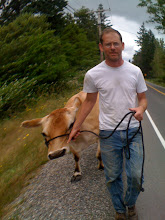 Dinah has returned. After seven weeks away from the Farm, she has come back to her home. In early July I walked Dinah across the Island to a farm that raised Scottish Highland cows and where there was a bull. I had been trying unsuccessfully for months to get her bred by using artificial insemination. The timing may have been off and at one point she had ovarian cysts which prevented her from ovulating. The veterinarian eventually took care of her cysts but she still was not conceiving. He suggested that I use a 'clean up bull'. I had never heard this term, but I love it. The clean up bull is the guy brought in at the end of the game to breed the cows at the dairy that couldn't be bred artificially. He gets the job done.
Dinah has returned. After seven weeks away from the Farm, she has come back to her home. In early July I walked Dinah across the Island to a farm that raised Scottish Highland cows and where there was a bull. I had been trying unsuccessfully for months to get her bred by using artificial insemination. The timing may have been off and at one point she had ovarian cysts which prevented her from ovulating. The veterinarian eventually took care of her cysts but she still was not conceiving. He suggested that I use a 'clean up bull'. I had never heard this term, but I love it. The clean up bull is the guy brought in at the end of the game to breed the cows at the dairy that couldn't be bred artificially. He gets the job done. Dinah needed his help and so I found a beautiful Scottish Highland cow nearby. She lived there through two cycles, the first time spending a lot of time with said bull, when there would have been a second cycle, she paid him no attention: she had 'settled'. It is not guaranteed that she was bred, but a good chance of it. I won't make her pee into a cup, but rather the vet will be out in another month or so to check her out.
But this isn't really the story here. The great thing is that she has returned. Dinah was my first cow and is therefore the Head Cow. She has the most seniority and rules the herd. During her absence it was a bit chaotic. The other bovines seemed aimless, looking for direction and wandering off by themselves. Dinah, a very head strong cow who takes her role seriously, has brought order back to the herd. She is on top, the rest below her. When she comes down the pasture to the milking parlor, the rest follow, no stragglers. I couldn't be happier.
In a few weeks we will know if she is bred and in mid April, with luck, she will calve. The good news would be she would come into milk again and be a part of the milking here again after a long absence, the bad news, if her calf is a heiffer, the chance of it being raised up to be a milker is small. The young female would be half Jersey and half Scottish Highland -- a odd combination for a milker. A young bull calf, however, would be ideal: the best of meat and dairy to be slaughtered after a year for meat for the Farm. We shall see.


